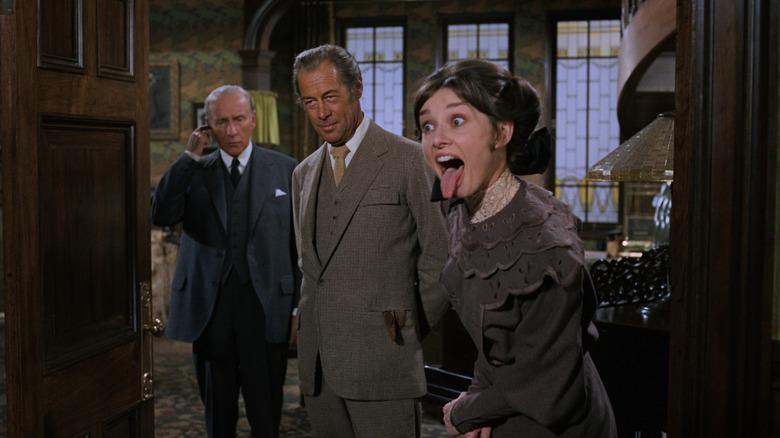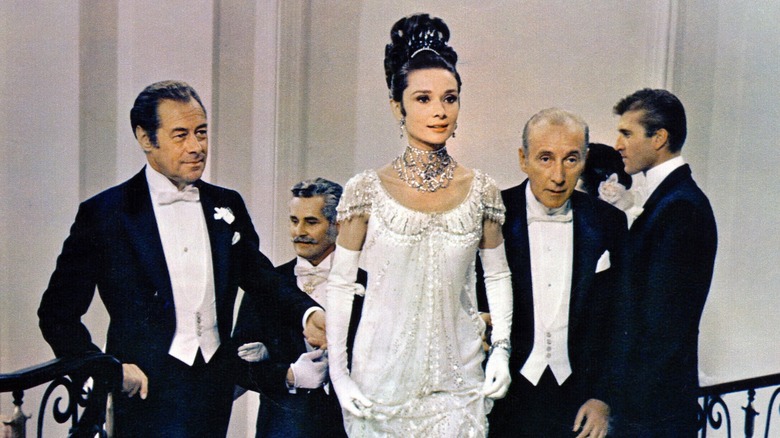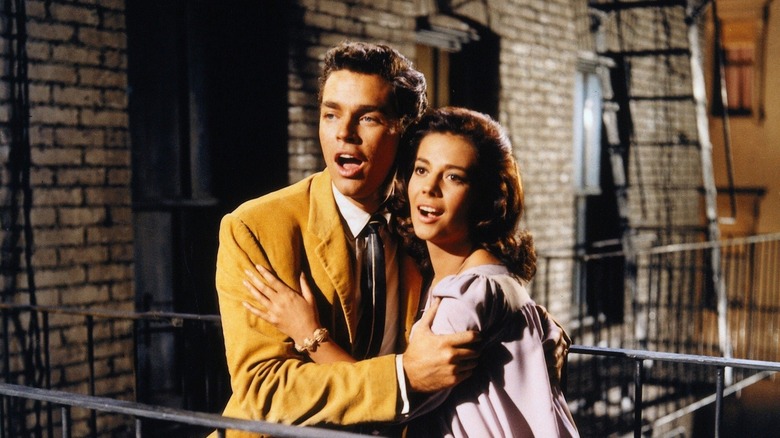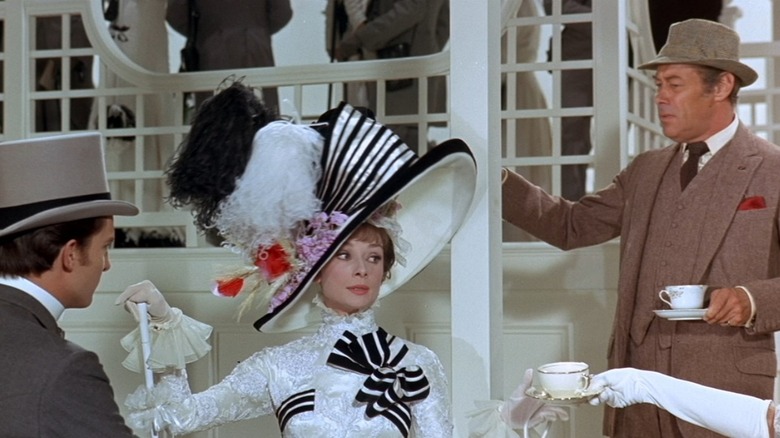Audrey Hepburn Didn't Get Her Way When It Came To My Fair Lady
The year 1964 gave us Hollywood's battle of the awful Cockney accents. There was Dick Van Dyke as Bert, the cheery jack-of-all-trades in "Mary Poppins," and Audrey Hepburn as Eliza, the screeching Cockney flower-seller in "My Fair Lady." Which is worse? Well, let's put it this way. The old definition of a Cockney was someone born within the sound of Bow Bells, but both actors sound more like they grew up closer to the Liberty Bell than the East End of London by the way they mangle the accent.
Perhaps you'd think Hepburn would develop something of an ear for the local dialect, having moved to London at the age of 15. Or perhaps not, because as the daughter of a rich family attending ballet school, maybe she didn't rub shoulders all that often with street urchins, pearly kings and queens, flower-sellers, and other working-class stereotypes before she hit the big time. Her attempt at Cockney isn't as bad as Van Dyke's, but she leans way too hard into it. It's panto-Cockney.
Hepburn was at the peak of her career when she was cast as Eliza Doolittle in George Cukor's interminable adaptation of the hit Broadway show. By then she was Hollywood royalty, having received her fourth Oscar nomination a few years earlier for one of her signature roles, Holly Golightly in "Breakfast at Tiffany's." She was chosen over Julie Andrews, who originated the role of Eliza on stage and was a natural in the part. However, the producers wanted someone with more star power (via Parade) and she may have ruined her own chances by refusing a screen test.
Yet while Hepburn was in her element playing princesses and society girls, she was woefully miscast as a working-class scruff. Her co-star Rex Harrison thought so, openly stating he preferred his Broadway Eliza (via The Stranger). But being such a big star didn't mean she was going to get it all her own way.
So what happens in My Fair Lady again?
Snooty Professor Henry Higgins (Rex Harrison) has a theory that a person's accent determines their social standing. To prove his point, he makes a bet with a fellow scholar that he can take working-class flower-seller Eliza Doolittle (Hepburn) off the street, teach her phonetics, and pass her off as a duchess at a swanky embassy ball. He moves her into his house and starts a rigorous course of exercises to help alter her accent and speech patterns, as well as correcting her bearing and teaching her polite etiquette.
Eliza reacts rather rowdily to the Professor's heavy-handed methods at first, much to the consternation of his servants who can't stand the racket. Eventually, they make progress and a bond develops between them. Higgins isn't really the romantic type, however, and after Eliza passes her big test at the ball, she feels under-appreciated and has her head turned by a handsome young suitor (Jeremy Brett).
"My Fair Lady" was adapted from the Broadway musical which, in turn, was an adaptation of George Bernard Shaw's famous play, "Pygmalion." It is almost three hours of Audrey Hepburn shrieking Cockney-sounding noises while Harrison huffs, puffs, and tuts.
I generally love those classic Technicolor musicals from the golden age of Hollywood, but I really hate "My Fair Lady." Everything about Hepburn's performance just triggers me. The whole film is so tiresome, and most of the songs are awful, too. The sole bright spot is Stanley Holloway as Eliza's incorrigibly dodgy old dad. My bitterness towards it is only compounded by the fact that it criminally won the Oscar for Best Picture over both "Dr. Strangelove" and "Mary Poppins," making it one of the most overrated Oscar winners ever.
Hepburn's singing voice needed dubbing... and she wasn't the only one
Hepburn got the part over Julie Andrews for the role of Eliza Doolittle, despite the fact she couldn't sing. She took singing lessons in an attempt to improve, but still couldn't cut it. As a result, Marni Nixon was drafted in to perform the vocals instead. It's not such a common practice nowadays, but back in the '50s and '60s, she was a little bit like the musical version of Harvey Keitel's character in "Pulp Fiction." So Marilyn Monroe is having trouble hitting her "Diamonds are a Girl's Best Friend" high notes? Call in Marni and no-one will ever know it happened.
Nixon's voice is instantly recognizable if you're familiar with those big glossy musicals of the period, with her vocal chords standing in for those of Deborah Kerr in "The King and I," Natalie Wood in "West Side Story" (above), and, of course, Hepburn in "My Fair Lady." She even made it in front of the camera for a small role in "The Sound of Music," where she played Sister Sophia in the song "Maria."
Ghost-singing was a fairly common practice in Hollywood at the time, although the stars who were dubbed often still got full credit for the vocal performance. Jo Ann Greer lent her vocal talents to Rita Hayworth, Kim Novak, and Gloria Grahame, Betty Wand dubbed for Leslie Caron in "Gigi," and Betty Noyes did a couple of songs for Debbie Reynolds in "Singin' in the Rain."
The latter is an interesting case, as the film features an important plot point involving ghost-singing. When Don Lockwood (Gene Kelly) and Lina Lamont (Jean Hagen) make the transition from silent cinema to the talkies, they have a big problem; Lina's voice sounds like a cat with its tail caught in a garbage disposal unit. To get over the problem, they persuade aspiring actress Kathy Selden (Debbie Reynolds) to sing for her. Reynolds dubbed Hagen singing the title tune, and Noyes dubbed Reynolds dubbing Hagen on "Would You?" But Hagen also dubbed Reynolds dubbing Hagen on the recording of a line of dialogue, because Hagen's rich real voice was preferred to Reynold's younger tones. Sorry for the nose bleed.
Did ghost-singing cause any bad feelings?
Not long before she passed away at the age of 86, Marni Nixon gave an interview about her experiences ghost-singing in Hollywood. Not everyone was appreciative of her efforts, and she claimed that Natalie Wood stormed off the set of "West Side Story," angry that word had gotten out and that audiences would know her singing voice wasn't up to scratch (via People).
As for Audrey Hepburn, she still wanted to get her own voice into "My Fair Lady," even after Nixon was brought in to ghost-sing for her, and there was some competition between them. Nixon recalled:
"She kept sneaking into the sound stage after I finished dubbing and would say, 'I think I can do myself better.' They gave me tapes of her singing, and I could hear her saying [to herself,] 'Oh darn, I think I can do better. Maybe I can't.' She was really hard on herself. But she kept trying...She was trying very hard to use as much of herself as possible."
Nixon pointed out that not all the singing in the film was her; Eliza's working-class singing voice was really Hepburn's own, while the "posher" sounding voice after Higgins has worked his phonetic magic is the ghost-singer. Did it cause any friction between her and Hepburn? Nixon said:
"No, never! Never! It was only appreciation. And she was trying to be as helpful as she could to tell me how to pronounce certain things and approve of it, to make sure it sounded like her – because if she couldn't do it, then she'd work harder to get the pronunciation into me. She was spectacular that way."
"My Fair Lady" was a box office hit and dominated the Oscars, winning eight of the twelve awards it was nominated for, including Best Picture and Director. Perhaps reflecting Hepburn's dreadful miscasting and the perceived injustice of her winning the role, the only acting nomination the film didn't receive was Actress. Rex Harrison took best actor and his Broadway Eliza, Julie Andrews, won Best Actress for "Mary Poppins.



